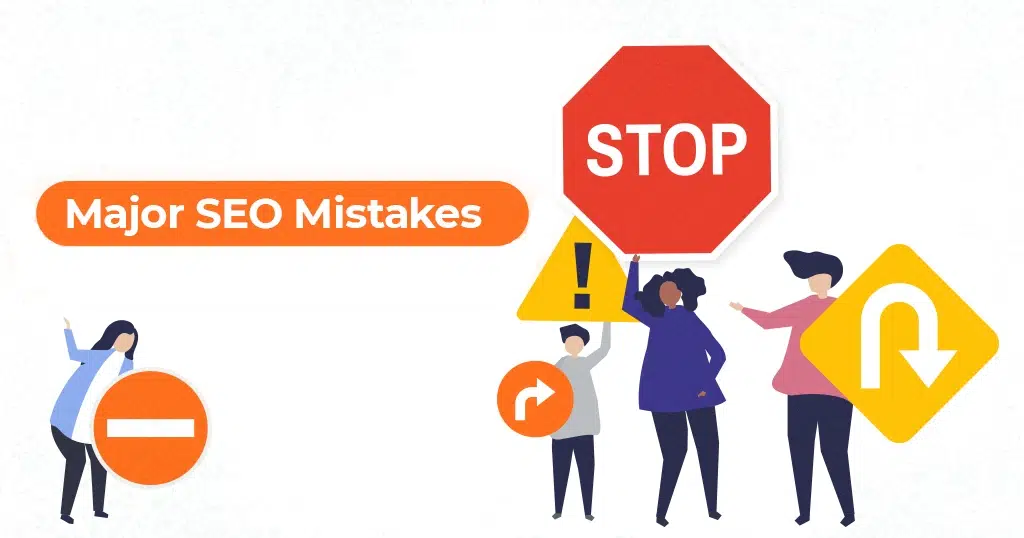Search engine optimization, otherwise known as SEO, is the lifeblood of any online business. SEO is very important to increase the online presence of any business. It is hard to survive without an online presence in this digital world. Everyone before buying any product or service research on google or any other search engine before they buy. While doing SEO there are many serious mistakes people make, which results in lower rankings and sometimes you get penalized by search engines.
Here are 8 Major SEO mistakes you should avoid, which are lowering your rankings.
1.Not Enough Keyword Research
Despite the obvious benefits of keyword research, many marketers don`t want to do full keyword research . They just think about a keyword and star writing about it but it does not works like this. You have to do proper keyword research to find it that keyword have good amount of traffic and also find out keywords difficulty(Keyword difficulty is metric which gives an idea of how much difficult it will be rank for that keyword). -For example, an ecommerce site might receive tons of traffic from “boots” if it uses broad keywords such as “boots for men.” However, only half of that traffic will convert to sales. Instead, a site targeting “waterproof women’s snow boots” might only receive 3% to 5% of traffic – but it will convert to sales.
One of the most common mistakes newbies make is confusing regional and global search terms. Sometime local business try to rank for a global term which is not beneficial and is very hard to rank for a small business. When choosing keywords, try to avoid single words and focus on two or three-word phrases. Always go for a long tail keyword which ranks you quickly and also gives benefit of adding several short keywords. You should also find competitors’ keyword strategies by using tools such as SEM Rush, BuxxSumo, and SpyFu.
2.Adding Thin Content
If you’re running a website, you’ve probably noticed that some pages are getting fewer visitors than others. In order to stop this from happening to your website, you need to take proactive steps to ensure that your pages are optimized for search engine visibility. One way to avoid making this mistake is to audit your website. This means checking Search Console for any suspicious pages, looking at the past organic traffic, and performing a website audit. To find and prevent thin content(one of 8 major SEO mistakes), you can also use tools like Screaming Frog or Siteliner to check your site’s pages for duplicate or thin content.
SEO content that ranks high establishes credibility and authority for a website. The search engines prefer articles that are relevant to their niche. Thin content is less likely to gain authority, and your site’s SEO ranking will suffer. This is because Google is concerned with mobile experiences, and they want your site to be user-friendly. Even if you write a 400-word blog post, it is still not considered thin content.
3.Under-optimizing Meta Tags
Many marketers do not understand the value of meta tags. While they can still improve the SEO of your website, they are rapidly becoming obsolete. You should make sure that your meta tags are optimized for each page of your website. Here are a few tips to optimize your meta tags:
Use meta tags to add technical SEO to your website. These tags are inserted into your page code and tell search engines what your content is about. Using these tags correctly will increase your search ranking and decrease your bounce rate. Also, using descriptive meta tags will increase the likelihood that people will click through to your site. If your website is too long, it will appear low in search engine results.
4.Not building backlinks
One of the most common SEO mistakes is not building backlinks. If you aren’t building the right types of backlinks, you will find it very hard to rank. Search engines prioritize “natural” over anything else. Sites that look like they’ve grown organically and have a good reputation will be prioritized in search results. Creating the right types of backlinks is a key SEO strategy.
While using anchor text is important for SEO, you should avoid using the same city name repeatedly. Google can identify your location by your IP address and physical address. That means that using city names in your backlinks will look spammy to Google. Also, people don’t write like that. Instead, try using similar key phrases and varying your linking structure. Don’t use city names in anchor texts unless you’re a genuinely local business.
Backlinks are the lifeblood of SEO. It’s critical for your website’s rankings to have a strong network of links from other websites. Many webmasters overlook this aspect of link building. A high-quality link from an authority website is worth more than a link from a directory. It’s also important to know how to get these links. To do that, you should follow these tips:
5.No Internal Linking
You’ve probably heard about the importance of internal linking. It’s a good idea to incorporate internal links into your content for many reasons, but the most obvious benefit is that it helps your visitors find the content they’re looking for. In addition to increasing your website’s traffic, internal linking builds trust with visitors. No internal linking is a major SEO mistake, but a relatively minor one.
Internal linking is essential to your site’s ranking, especially when it comes to a specific keyword. Without them, Google will punish your site for trying to sell links to your website. Internal linking also helps your site to discover new content. Additionally, it helps the flow of PageRank around your site, so the more internal links you have, the better. So, why do internal links matter? Read on to learn why internal linking is so important to your SEO success.
6.Using Duplicate Content
Duplicate content is major SEO mistakes, it can also hurt your rankings and can even get your website penalized. Essentially, duplicate content is content that appears on more than one location on your website or content you copied for someone else website. Google refers to this problem as being “appreciably similar,” which means that the search engine cannot differentiate the content. This can cause your site to be deindexed, which means less organic traffic. Here are three ways that you can avoid duplicate content:
Duplicate content can come in many forms. It can come from boilerplate text in global navigation, company about sections in press releases, or core website themes. But, despite its common appearance, duplicate content does not affect your website’s ranking. It may even increase your competitors’. Here are some ways to fix duplicate content on your website. Once you spot the problem, you can focus on boosting your site’s SEO.
Creating content that’s too similar to other pages is bad for your search engine ranking. If the same piece of content appears on different pages, Google will flag it as duplicate content. While it’s possible to swap out a few words, it’s better to avoid this issue altogether. Nevertheless, you can still provide your readers with the information they’re looking for. But the search engine will have to make a choice between duplicate content and your site’s pagerank.
7.Slow website speed
It’s easy to forget that slow website’s speed is also an major SEO mistakes everyone make, even now page speed is officially ranking factor for Google. It’s no secret that a slow website will decrease your rankings, and it can also lead users to visit your competitors’ sites. Google also tracks and punishes sites that take too long to load. Many website owners ignore the importance of page speed and neglect its importance, but it can greatly affect your website’s conversion rates and user experience.
If you’re wondering whether your website is slow, consider this: Your visitors’ mental state is impacted by the time it takes to load your page. A delay of even 10 milliseconds increases the chance of a visitor’s impatience and frustration, and will deter them from returning to your site. So, make sure your website is fast. Don’t wait any longer! Instead, take action today.
8.Not matching search intent
Another major SEO mistakes is not matching search intent. Google is highly concerned about search intent, and when users find results that are irrelevant to what they are looking for, it sends signals that your site is not relevant. This lowers your ranking in the search results, and can lead to fewer visitors. Google’s goal is to make the user’s experience as pleasant as possible. If you’re not meeting the search intent of the user, you’re not going to get any traffic.
In the past, search engines didn’t fully understand user intent. They simply looked for keywords on a page. However, Google has made huge investments in understanding user intent and queries. A recent update to their algorithm known as BERT, the quality Rater guidelines, focuses on matching search intent. Search intent is now one of the most important factors for the search engine. Otherwise, your content will be ignored.


Recent Comments